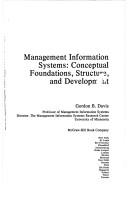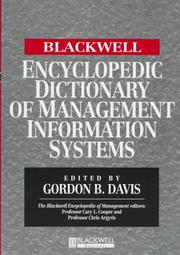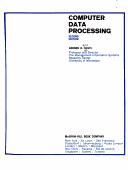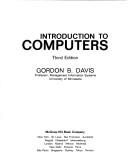| Listing 1 - 10 of 40 | << page >> |
Sort by
|

ISBN: 0070158274 9780070158276 Year: 1974 Publisher: New York (N.Y.): MacGraw-Hill
Abstract | Keywords | Export | Availability | Bookmark
 Loading...
Loading...Choose an application
- Reference Manager
- EndNote
- RefWorks (Direct export to RefWorks)
Information systems --- Management information systems --- Systèmes d'information de gestion --- Management information systems. --- 681.3*A --- 681.3*H4 --- 681.3*H42 --- Computer-based information systems --- EIS (Information systems) --- Executive information systems --- MIS (Information systems) --- Sociotechnical systems --- Information resources management --- Management --- General literature --- Information systems applications (GIS etc.) --- Types of systems: decision support (e.g. MIS); logistics (Information systemsapplications --- Communication systems --- 681.3*H42 Types of systems: decision support (e.g. MIS); logistics (Information systemsapplications --- 681.3*H4 Information systems applications (GIS etc.) --- 681.3*A General literature

ISBN: 1557869480 Year: 1997 Volume: 3 Publisher: Cambridge, Mass. : Blackwell,
Abstract | Keywords | Export | Availability | Bookmark
 Loading...
Loading...Choose an application
- Reference Manager
- EndNote
- RefWorks (Direct export to RefWorks)
Business --- Management information systems --- Office management --- System analysis --- Gestion --- Systèmes d'information de gestion --- Bureaux --- Analyse de systèmes --- Data processing --- Dictionaries --- Informatique --- Dictionnaires anglais --- Organisation --- Systèmes d'information de gestion --- Analyse de systèmes --- Dictionaries.
Book
ISBN: 3319674064 3319674072 Year: 2018 Publisher: Cham : Springer International Publishing : Imprint: Springer,
Abstract | Keywords | Export | Availability | Bookmark
 Loading...
Loading...Choose an application
- Reference Manager
- EndNote
- RefWorks (Direct export to RefWorks)
This volume of essays offers direct comparisons of historic Western and Buddhist perspectives on ethics and metaphysics, tracing parallels and contrasts all the way from Plato to the Stoics, Spinoza to Hume, and Schopenhauer through to contemporary ethicists such as Arne Naess, Charles Taylor and Derek Parfit. It compares and contrasts each Western philosopher with a particular strand in the Buddhist tradition, in some chapters represented by individual writers such as Nagarjuna, Vasubandhu, Santideva or Tsong Khapa. It does so in light of both analytic concerns and themes from the existentialist and phenomenological traditions, and often in an ecumenical spirit that bridges both analytic and continentalist approaches. Some of the deepest questions in ethics, dealing with the scope of agency, value-laden notions of personhood and the nature of value in general, are intertwined with questions in metaphysics. One set of questions addresses how varying conceptions of selfhood relate to moral values (e.g. the concern of self or selves for the well-being of others); another set of questions addresses how a conception of oneself or one’s selves should or should not affect how one thinks of happiness, or eudaimonia, or – in classical Indian terms – artha, sukha or nirvana. Western philosophy has featured discussion of both, but some would argue that certain traditions of Asian philosophy have offered a more sustained and even treatment of both sets of questions. The Buddhist tradition in particular has not only featured much discussion on both fronts, but has attracted many contemporary philosophers to its distinctive spectrum of approaches, and to what is – from many ‘Western’ points of view – a seemingly subversive analysis of ego, selfhood and personhood, whether in metaphysical, phenomenological or other incarnations. .
Philosophy. --- Buddhism. --- Ethics. --- History of Philosophy. --- Deontology --- Ethics, Primitive --- Ethology --- Moral philosophy --- Morality --- Morals --- Philosophy, Moral --- Science, Moral --- Philosophy --- Values --- Buddha and Buddhism --- Lamaism --- Ris-med (Lamaism) --- Religions --- Mental philosophy --- Humanities --- Metaphysics. --- God --- Ontology --- Philosophy of mind --- Philosophy (General). --- Moral Philosophy and Applied Ethics. --- History.

ISBN: 0070157855 Year: 1973 Publisher: New York (N.Y.): MacGraw-Hill
Abstract | Keywords | Export | Availability | Bookmark
 Loading...
Loading...Choose an application
- Reference Manager
- EndNote
- RefWorks (Direct export to RefWorks)
Electronic data processing --- Electronic digital computers --- 681.3* / / / / / / / / / / / / / / / / / / / / / / / / / / / / --- Automatic digital computers --- Computers, Electronic digital --- Digital computers, Electronic --- Computers --- Hybrid computers --- Sequential machine theory --- ADP (Data processing) --- Automatic data processing --- Data processing --- EDP (Data processing) --- IDP (Data processing) --- Integrated data processing --- Office practice --- Computerwetenschap --- Automation --- Computer. Automation --- dataprocessing --- informatica
Book
ISBN: 0070158215 Year: 1971 Publisher: New York (N.Y.): MacGraw-Hill
Abstract | Keywords | Export | Availability | Bookmark
 Loading...
Loading...Choose an application
- Reference Manager
- EndNote
- RefWorks (Direct export to RefWorks)
Electronic digital computers --- 681.3*A1 --- 681.3*A1 Introductory and survey --- Introductory and survey --- Automatic digital computers --- Computers, Electronic digital --- Digital computers, Electronic --- Computers --- Hybrid computers --- Sequential machine theory --- Computer. Automation
Book
ISBN: 2920653199 Year: 1986 Publisher: Paris : G. vermette,
Abstract | Keywords | Export | Availability | Bookmark
 Loading...
Loading...Choose an application
- Reference Manager
- EndNote
- RefWorks (Direct export to RefWorks)
Book
ISBN: 9781862392144 Year: 2007 Publisher: London : Geological Society,
Abstract | Keywords | Export | Availability | Bookmark
 Loading...
Loading...Choose an application
- Reference Manager
- EndNote
- RefWorks (Direct export to RefWorks)
Book
Year: 1971 Publisher: New York, NY : McGraw-Hill,
Abstract | Keywords | Export | Availability | Bookmark
 Loading...
Loading...Choose an application
- Reference Manager
- EndNote
- RefWorks (Direct export to RefWorks)

ISBN: 0070158258 Year: 1985 Publisher: Auckland : McGraw-Hill,
Abstract | Keywords | Export | Availability | Bookmark
 Loading...
Loading...Choose an application
- Reference Manager
- EndNote
- RefWorks (Direct export to RefWorks)
Digital
ISBN: 9783319674070 Year: 2018 Publisher: Cham Springer International Publishing
Abstract | Keywords | Export | Availability | Bookmark
 Loading...
Loading...Choose an application
- Reference Manager
- EndNote
- RefWorks (Direct export to RefWorks)
This volume of essays offers direct comparisons of historic Western and Buddhist perspectives on ethics and metaphysics, tracing parallels and contrasts all the way from Plato to the Stoics, Spinoza to Hume, and Schopenhauer through to contemporary ethicists such as Arne Naess, Charles Taylor and Derek Parfit. It compares and contrasts each Western philosopher with a particular strand in the Buddhist tradition, in some chapters represented by individual writers such as Nagarjuna, Vasubandhu, Santideva or Tsong Khapa. It does so in light of both analytic concerns and themes from the existentialist and phenomenological traditions, and often in an ecumenical spirit that bridges both analytic and continentalist approaches. Some of the deepest questions in ethics, dealing with the scope of agency, value-laden notions of personhood and the nature of value in general, are intertwined with questions in metaphysics. One set of questions addresses how varying conceptions of selfhood relate to moral values (e.g. the concern of self or selves for the well-being of others); another set of questions addresses how a conception of oneself or one’s selves should or should not affect how one thinks of happiness, or eudaimonia, or – in classical Indian terms – artha, sukha or nirvana. Western philosophy has featured discussion of both, but some would argue that certain traditions of Asian philosophy have offered a more sustained and even treatment of both sets of questions. The Buddhist tradition in particular has not only featured much discussion on both fronts, but has attracted many contemporary philosophers to its distinctive spectrum of approaches, and to what is – from many ‘Western’ points of view – a seemingly subversive analysis of ego, selfhood and personhood, whether in metaphysical, phenomenological or other incarnations. .
Philosophy --- General ethics --- History of philosophy --- Indian religions --- ethiek --- filosofie --- geschiedenis --- boeddhisme
| Listing 1 - 10 of 40 | << page >> |
Sort by
|

 Search
Search Feedback
Feedback About
About Help
Help News
News